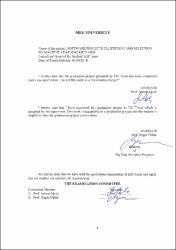Please use this identifier to cite or link to this item:
https://hdl.handle.net/20.500.11779/1199| Title: | Software Projects Clustering and Selection by Machine Learning Methods |
| Other Titles: | Makine öğrenmesi metodları ile yazılım geliştirme projeleri sınıflandırması ve seçimi |
| Authors: | Torun, Elif |
| Advisors: | Ağralı, Semra |
| Keywords: | Project Clustering Project Selection Demand Management K- Means Logistic Regression Support Vector Machine Proje Kümeleme Proje Seçimi Talep Yönetimi |
| Publisher: | MEF Üniversitesi, Fen Bilimleri Enstitüsü |
| Source: | Torun, E. (2018). Software projects clustering and selection by machine learning methods, MEF Üniversitesi Fen Bilimleri Enstitüsü, İstanbul, Türkiye |
| Abstract: | In today’s hyper volatile business world, software development projects play key roles in maintain the current situation of the company and they are vital in taking the company one step further. Selecting the right project to invest is a critical decision point regarding the hard competition, diminishing profitability and high cost of the projects. The main aim of this study is clustering the projects and deciding which project to invest by using machine learning methods. We use IT project demands data of one of the biggest banks due to the capital, number of transactions and number of customer portfolio in Turkey. The data includes 2048 Information Technology related project demands occurred in 2017 and 2018. For the clustering part of the project both unsupervised and supervised learning methods are used and success rates are compared. We observe that supervised learning methods are more successful than the unsupervised ones. For the project selection part all process of the bank and output of the all steps are reviewed. According to our results, second workshop, which is the last step of the project assessment and selection process, has almost 50% of the total process effort and gives the precise effort estimation as an outcome, can be eliminated, and the project selection decision can be made with around 90% success ratio with machine learning methods. The result of this study provides an efficient way to select projects and a platform to see the complexity of the project portfolio. Günümüzün hızla değişen iş dünyasında, yazılım geliştirme projeleri şirketlerin mevcut durumlarını korumak için anahtar oyuncularken, şirketi bir adım ileri götürmek için de zorunludur. Sıkı rekabet koşulları, azalan karlılıklar ve projelerin yüksek maliyetleri göz önüne alındığında, doğru projeye yatırım yapmanın kritik bir karar noktası olduğunu görüyoruz. Bu çalışmanın amaçları, makine öğrenmesi metotları kullanılarak projeleri karmaşıklık seviyelerine göre sınıflandırmak ve hangi projelere yatırım yapılması gerektiğine karar vermektir. Çalışmada Türkiye’nin sermaye, işlem sayısı ve müşteri portföyü açısından en büyük bankalarından birinin Bilişim Teknolojileri proje talepleri kullanılmıştır. Veride 2017 ve 2018 yıllarında talep edilen 2048 proje bulunmaktadır. Sınıflandırma problemi için gözetimsiz ve gözetimli öğrenme teknikleri kullanılarak, başarı oranları karşılaştırılmıştır. Sonuç olarak gözetimli öğrenme tekniğinin proje sınıflandırmasında daha başarılı olduğu tespit edilmiştir. Proje seçim problemi için de tüm süreç ve çıktılar gözden geçirilmiştir. Sonuç olarak proje planlama sürecinin toplam eforunun yaklaşık %50’sini alan ikinci çalıştay kaldırılarak, makine öğrenmesi teknikleri ile proje seçiminde yaklaşık %90 başarıya ulaşıldığı görülmüştür. Bu çalışmanın sonucu, proje seçim sürecinde verimlilik artışı sağlamakta ve proje portföyündeki karmaşıklığı gösteren bir platform sunmaktadır. |
| URI: | https://hdl.handle.net/20.500.11779/1199 |
| Appears in Collections: | Yüksek Lisans, Proje Koleksiyonu |
Files in This Item:
| File | Description | Size | Format | |
|---|---|---|---|---|
| ElifTorun.pdf | YL-Proje Dosyası | 1 MB | Adobe PDF |  View/Open |
CORE Recommender
Sorry the service is unavailable at the moment. Please try again later.
Items in GCRIS Repository are protected by copyright, with all rights reserved, unless otherwise indicated.